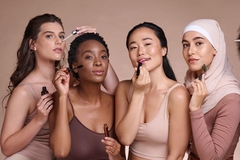Tit-for-tat tariffs: Beauty giants ask EU to exclude American cosmetics from trade war

Major European beauty companies are urging the EU to exclude American cosmetic goods from its tariff rollout next month. The group of 16 beauty executives, called the Value of Beauty Alliance, is warning that tariff retaliations against the US could hurt the EU’s personal care industry — one of the region’s biggest sectors.
The beauty and personal care value chain adds €180 billion (US$194.34 billion) to the EU27 GDP and supports almost 3.2 million jobs. French labor union FEBEA reports that in France alone, beauty imports from the US amount to US$500 million, while exports are worth roughly €2.5 billion (US$2.7 billion).
The Value of Beauty includes companies such as L’Oréal, Beiersdorf, Givaudan, and IFF. These European companies have a large presence in the US — L’Oréal’s North American region had €11.8 billion (US$12.74 billion) in sales last year.

Following US President Donald Trump’s promise to impose a 25% tariff on steel and aluminum, the EU published a 99-page list of counter-tariffs on US goods, including shampoos, perfumes, aftershaves, and sunscreens.
“Our hope is that retaliatory measures do not escalate. Europe is a world leader in cosmetics and personal care. Five of the top seven industry players are European, the other two are American. Putting beauty and cosmetics on the European retaliation list would be a very bad idea, so it is a high preoccupation for all the Value of Beauty Alliance CEOs,” a Beiersdorf spokesperson tells Personal Care Insights.
 Beauty brands warn tariffs could disrupt personal care supply.“We call on policymakers to ensure that EU trade policy is designed to support the competitiveness of our value chain on the world stage.”
Beauty brands warn tariffs could disrupt personal care supply.“We call on policymakers to ensure that EU trade policy is designed to support the competitiveness of our value chain on the world stage.”
The tariffs are set to take effect on April 13, but the EU is still garnering business opinions on the matter.
Lobbying the EU
The Value of Beauty Alliance met with EU officials in Brussels last week.
“We explained [to the officials] several times that it’s a mistake” to include beauty and cosmetics,” Vincent Warnery, chief executive of Beiersdorf, told the Finacial Times. Warnery said the move would act as “shooting ourselves in the foot.”
L’Oréal CEO Nicolas Hieronimus also told the Financial Times that he urged the officials to look at the balance of trade before subjecting entire categories to the upcoming tariff.
“If there is this tit-for-tat thing on beauty, it’s going to penalize Europe much more than American businesses and companies. If you’re going to put a category in the tariff war, you’d better make sure that this category is a net importer rather than net exporter.”
“We’ll raise prices in the US if needed, which will hurt consumers in the US and Canada and will also hurt our market share . . . So leave us out of it, enjoy what we bring to the economy, and don’t start a fire where there is no need.”
L’Oréal and Beiersdorf are based in France and Germany, respectively, the EU’s biggest cosmetics markets. Approximately two-thirds of Beiersdorf’s US business comes from beauty products made outside the US, primarily in Mexico.
“The gathering of the CEOs of the Alliance has been planned for a long time, long before the change in the US leadership and the latest developments on trade and tariffs. As global competition grows, EU’s trade agreements must prioritize market access, reduce regulatory barriers, and support the export of high-quality and innovative European products such as ours,” the Beiersdorf spokesperson told us.
Preparations and predictions EU trade plans may impact US-EU cosmetics trade.
EU trade plans may impact US-EU cosmetics trade.
The cosmetics sector is attractive to small and medium-sized US exporters due to the low import tariffs imposed by the EU. For example, the EU does not charge customs duty on hair products, manicure and pedicure products, perfumes, many essential oils, and lip and eye makeup.
However, this is set to change under the new tariffs.
L’Oréal’s Hieronimus said he was not too concerned when the US imposed tariffs, as most of its beauty products are made within the country. However, now that the EU is fighting back, the industry is hoping tariff adjustments will be made so it does not have to prepare for a new economic landscape.
The personal care industry has been eagerly awaiting how the tariff war will unfold. Personal Care Insights previously spoke to multiple US-based personal care companies after the Personal Care Products Council expressed “significant concerns” about potential policy changes under the Trump administration. However, some US brands were confident they could navigate the changes.













